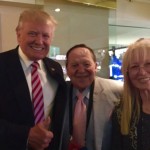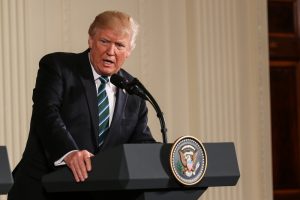 With the widely touted shift in the public opinion polls after the first presidential debate, Mitt Romney is no longer an underdog. That being the case, his pronouncements are attracting some well-deserved scrutiny from mainstream media sources. Romney’s major foreign policy speech at the Virginia Military Institute on Oct. 8 is being fact-checked — and castigated — by the Associated Press, CNN, and even by Fox News.
With the widely touted shift in the public opinion polls after the first presidential debate, Mitt Romney is no longer an underdog. That being the case, his pronouncements are attracting some well-deserved scrutiny from mainstream media sources. Romney’s major foreign policy speech at the Virginia Military Institute on Oct. 8 is being fact-checked — and castigated — by the Associated Press, CNN, and even by Fox News.
Among the more egregious calumnies in the speech is Romney’s mischaracterization of Obama’s response to the 2009 election in Iran.
… when millions of Iranians took to the streets in June of 2009, when they demanded freedom from a cruel regime that threatens the world, when they cried out, “Are you with us, or are you with them?”—the American President was silent.
CNN has done a remarkably good job of laying out and scrutinizing Romney’s accusations, and the harsh Republican and neoconservative criticism of President Obama’s response to the Iranian election in mid-June 2009. Are Romney’s accusations factual? No, according to CNN: “During the first couple of days of the protests and violence, Obama did not weigh in publicly, but by a few days in, he was not “silent”– and a week later, took a tougher stance.”
As Glenn Kessler pointed out in a Washington Post article from June 19, 2009, “President Obama and his advisers have struggled to strike the right tone, carefully calibrating positive messages about the protests in an effort to avoid giving the government in Tehran an excuse to portray the demonstrators as pro-American.” Iranian human rights activist Shirin Ebadi told Kessler in a telephone interview that she had no complaints about Obama’s response. “What happens in Iran regards the people themselves, and it is up to them to make their voices heard,” she said.
This past January, former GOP-nomination contender Rick Santorum also assailed Obama’s response to the post-election protests in Iran, as 2008 presidential rival John McCain had. Santorum’s Jan. 1, 2012 exchange with David Gregory on Meet the Press provides the blueprint for the charges Romney hurled at Obama at VMI. Whoever is prepping the President for the upcoming foreign policy debate might find Gregory’s tough, pointed and well-informed questions a useful model for dealing with Romney’s dissembling:
MR. GREGORY: Before you go, I want to ask you about foreign policy. You’ve been very critical of the president, particularly on the issue of Iran, which has been a big issue of debate here in Iowa. Let me play a portion of that.
(Videotape, December 7, 2011)
FMR. SEN. SANTORUM: And this president, for every thug and hooligan, for every radical Islamist, he has had nothing but appeasement. We saw that during the lead up to World War II. Appeasement.
(End videotape)
MR. GREGORY: How can that possibly be accurate, if you’ve taken an objective look at the foreign policy of this administration? What on Iran specifically separates the approach that President Obama has taken and that of President Bush?
FMR. SEN. SANTORUM: Number one, he didn’t support the pro-democracy movement in Iran in 2009 during the Green Revolution. Almost immediately after the election, I mean, excuse me, like with hours after the, the polls closed, Ahmadinejad announced that he won with 62 percent of the vote. Within a few days, President Obama basically said that that was–election was a legitimate one.
MR. GREGORY: But what would that have done specifically to disarm Iran?
FMR. SEN. SANTORUM: Well, well, I understand why the president would, would understand that, you know, someone announcing the minute after the polls closed that he won, I mean, he comes from Chicago, so I get it. But the problem is that this was an illegitimate election. The people in the streets were rioting saying, please support us, President Obama. We are the prodemocracy movement. We want to turn this theocracy that has been at war with the United States, that’s developing a nuclear weapon, that’s, that’s killing our troops in Afghanistan and Iraq with IEDS. And the president of the United States turned his back on them. At the same time, a few years–a year later, we have the same situation where Muslim Brotherhood and Islamists are in the streets of, of Egypt opposing an ally of ours, not a sworn enemy like Iran, but an ally of ours in Mubarak…
MR. GREGORY: I’m sorry. The question I asked you…
MR. SEN. SANTORUM: …and he joins the radicals instead of…
MR. GREGORY: Wait a second.
FMR. SEN. SANTORUM: …standing with our friends.
MR. GREGORY: The–first of all, that’s patently contradictory. If you say you support democracy, there was a democratic movement in Egypt and the Muslim Brotherhood got elected. So how could you be for democracy in some countries and not others?
FMR. SEN. SANTORUM: I don’t, because, because…
MR. GREGORY: Which is inconsistent.
FMR. SEN. SANTORUM: No. The Muslim Brotherhood is not–is not about democracy. The Muslim Brotherhood are Islamists. The Muslim Brotherhood are going to impose Sharia law.
MR. GREGORY: They were popularly elected, I think. Isn’t that what democracy is about?
FMR. SEN. SANTORUM: No. No.
The day after Santorum’s appearance on Meet the Press, FactCheck critiqued his claims:
Iran’s presidential election was June 12, 2009, and President Mahmoud Ahmadinejad declared victory — triggering protests in Tehran. On June 15, Obama said at a press conference: “We weren’t on the ground, we did not have observers there, we did not have international observers on hand, so I can’t state definitively one way or another what happened with respect to the election. But what I can say is that there appears to be a sense on the part of people who were so hopeful and so engaged and so committed to democracy who now feel betrayed. And I think it’s important that, moving forward, whatever investigations take place are done in a way that is not resulting in bloodshed and is not resulting in people being stifled in expressing their views.”
Obama issued a statement five days later again condemning Iran’s post-election “violent and unjust actions against its own people” and asserting that the U.S. “stands with all who … exercise” the “universal rights to assembly and free speech.” It was one of many such statements.
FactCheck also noted that the Washington Times had reported on June 27, 2009 that Obama was being cautious in what he said about the election results because he didn’t want to be accused of interfering and providing Mahmoud Ahmadinejad with a propaganda “tool.”
While other leaders have been more out front in their criticism, Mr. Obama has taken pains not to appear to meddle in the debate on the actual election results, arguing he doesn’t want his words to become propaganda for the Iranian regime. “Only I’m the president of the United States, and I’ve got responsibilities in making certain that we are continually advancing our national security interests and that we are not used as a tool to be exploited by other countries,” he said at a press conference Tuesday.
Fact checkers Brooks Jackson and Eugene Kiely concluded that, in comparing Obama’s handling of the elections in Iran and Egypt, “Obama treated both cases similarly: condemning the governments’ use of violence against their own citizens and supporting the protesters right to protest.”
Progressives and conservatives can find many faults with the Obama’s administration’s handling of foreign policy in general and dealings with Iran in particular. The question in the upcoming election is whether Mitt Romney could or would do any better. Daniel Larison, a staunch conservative, doesn’t seem to think so. In “Mitt Romney’s Vapid, Misleading Foreign Policy Speech” Larison writes:
The failings of Romney’s foreign policy arguments are not entirely his. Boxed in by his party’s hawks and most Republicans’ unwillingness to acknowledge Bush administration blunders, Romney’s script was to some extent written for him before he became a candidate. Not being in a position to lead his party in a new direction on this or any other issue, he had already embraced the worldview that he found among Republican hawks in an effort to become acceptable to them. Unfortunately for the country, Americans could have used a credible opposition party and presidential candidate to hold the administration accountable for its real mistakes.
Amen.





A couple more lies:
“when millions of Iranians took to the streets”
millions did not march against the Iranian government – if they had, there would have been regime change – somewhere in the region of 100,000 turned out for the major protests.
“a cruel regime that threatens the world”
Iran unlike the United States doesn’t threaten anyone.